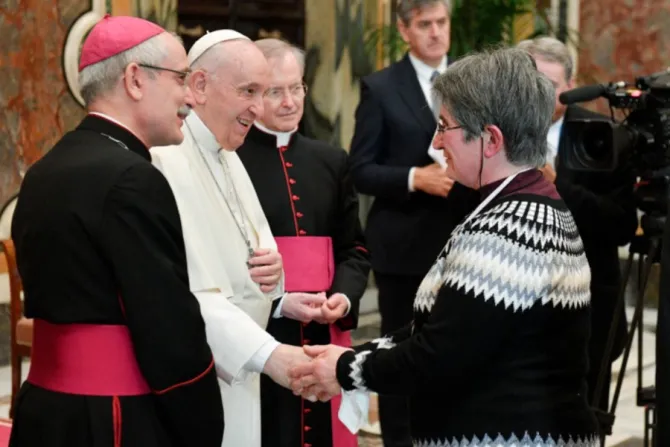Pope Francis meets a delegation of the French Catholic Action movement at the Vatican, Jan. 13, 2021. | Vatican Media.
Pope Francis said yesterday that synodality is not a “search for majority consensus,” but rather a “style” guided by the Holy Spirit.
The pope made the remark in an address to a delegation of French Catholic Action groups at the Vatican on Jan. 13.
“The Church as a whole is also engaged in a synodal process, and I count on your contribution,” he said.
“Let us remember, in this regard, that synodality is not a simple discussion. It is not an ‘adjective.’ Never ‘adjectivize’ the substantiality of life.”
“Synodality is not even the search for majority consensus, this is done by a parliament, as is done in politics. It is not a plan, a program to be implemented.”
“No. It is a style to be adopted, in which the main protagonist is the Holy Spirit, who expresses himself above all in the Word of God, read, meditated upon, and shared together.”
Pope Francis formally launched a two-year global consultation process, leading to the 2023 synod on synodality, last October.
Members of the French Catholic Action movement are taking part in a Jan. 11-16 pilgrimage to the Vatican to raise awareness of their work, accompanied by Archbishop François Fonlupt of Avignon.
France’s Catholic Action groups include bodies such as Action catholique des enfants, for children, Action catholique ouvrière, focused on workers, and the Mouvement rural de jeunesse chrétienne, for young people living in the countryside.
ACI Stampa, CNA’s Italian-language news partner, reported that the pilgrimage includes not only an audience with the pope but also meetings with Vatican Secretary of State Cardinal Pietro Parolin and Cardinal Mario Grech, secretary-general of the Synod of Bishops, as well as other senior curial officials.
The pilgrimage’s theme is “Being apostles today,” the title of a 48-page document describing the groups’ activities.
In his address in the Vatican’s Clementine Hall, Pope Francis spoke about “our call to be effective apostles today.”
He drew on the “See-Judge-Act” method formulated by the Belgian Cardinal Joseph Cardijn and incorporated it into Catholic social teaching by Pope John XXIII in his 1961 encyclical Mater et Magistra.
of life.”
“This first stage is fundamental; it consists in stopping to observe the events that shape our lives, what constitutes our history, our family, cultural, and Christian roots,” Pope Francis said.
He went on: “The second stage is judging or, one might say, discerning. It is the moment in which we allow ourselves to be questioned and challenged. The key to this stage is the reference to Sacred Scripture.”
He urged Catholic Action groups to “always leave an important place to the Word of God in the life of your groups,” while giving “space to prayer, interiority, and adoration.”
The pope said that the third stage, acting, was concerned with “God’s initiative.”
“Our role, then, is to support and foster God’s action in our hearts, adapting to the ever-changing reality,” he said.
He noted that Europe had experienced significant cultural changes in recent years.
“The people your movements reach — I am thinking in particular of young people — are not the same as they were a few years ago,” he said.
“Today, especially in Europe, those who frequent Christian movements are more sceptical of institutions, they seek less demanding and more ephemeral relationships. They are more sensitive to affectivity, and therefore more vulnerable, more fragile than previous generations, less rooted in faith, but nevertheless in search of meaning and truth, and no less generous.”
“It is your mission, as Catholic Action, to reach out to them as they are, to make them grow in the love of Christ and their neighbour, and to lead them to a greater concrete commitment, so that they may be protagonists of their lives and the life of the Church, so that the world may change.”
Source: CNA

